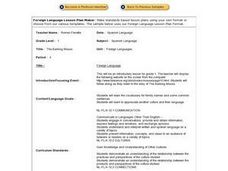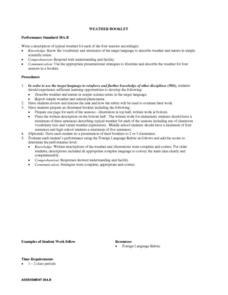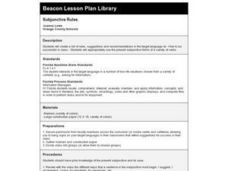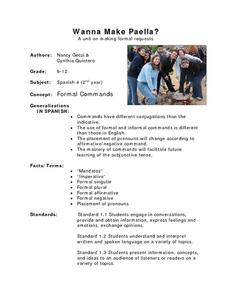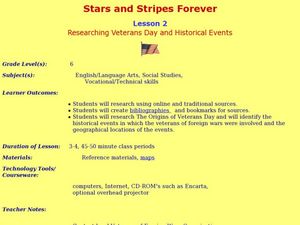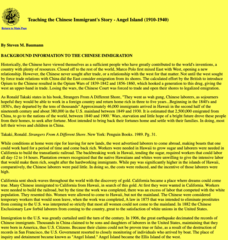City University of New York
Women's Suffrage and World War I
Democracy cannot exist where not everyone has equal rights. Discuss the state of democracy and women's suffrage during World War I with class discussions, debates, and primary source analysis, in order for class members to connect...
Curated OER
The Banking Mouse
First graders learn about another culture and its language. In this Spanish lesson, 1st graders listen to a Cuban folktale. Students identify the Spanish words. Students reread the story independently. Students listen to a...
Curated OER
Two Plus Two
Students solve simple math problems in the target language using words instead of numberals. They use the appropriate interpretive strategies to compute in the taget language. Students use complex language structures to solve the...
Curated OER
PICTURE ID
Students name or label some pictures of important people and events from areas where the target language is spoken. They study prominent people in history and identify individual pictures of prominent people from the target culture(s)....
Curated OER
Size, Shape, and Color
Students demonstrate that they can identify simple geometric shapes and compare them by color and size accordingly: by the main shapes, sizes, and color. They comprehend the names of the sizes, shapes and colors in the target language.
Curated OER
Weather Booklet
Young scholars write a description of typical weather for each of the four seasons. They use the vocabulary and structures of the target language to describe weather and nature in simple scientific terms. Students use the appropriate...
Curated OER
Subjunctive Rules
Students create a list of rules, suggestions and recommendations in the target language on how to be successful in class. They appropriately use the present subjunctive forms of a variety of verbs.
Curated OER
Diplomatic Duties
Tenth graders research and illustrate the diplomatic policies of American presidents, and write letters critiquing the policies of specific presidents. March 17, 2003)
Curated OER
Contributions of Immigrants
Students identify the contributions of immigrants to America. They analyze the value of these contributions as well. They discuss how these contributions affect other's personal perspectives of immigrants.
Curated OER
In 'Other words' Writing Gently Humorous Essays About Stereotypes
Define and understand what stereotypes are by reading an article with stereotyping in it. Learners will locate how it shows stereotyping and answer questions about the stereotypes. Finally, they will write their own pieces of original work.
Curated OER
Social Movements in American Politics
Young scholars explore American social movements. In this writing skills activity, students read Orwell's "Politics and the English." Young scholars then apply the rules for writing that are included in the piece. Students follow-up by...
Curated OER
Cultural Issues
Students observe another culture using a provided simulation script and then make assumptions about that culture based on what they witnessed. They will later be debriefed and talk about the assumptions they made that were not accurate.
Curated OER
Smithsonian Asian Pacific American Lesson: Immigration
Many of your class members will have heard of Executive Order 9066 and the Japanese internment camps of World War II. Some may even recognize the terms “Issei” and “Nisei,” but few will have heard of Enemy Alien Hearing Boards, of the...
Curated OER
Making Formal Requests
Students investigate the concept of making formal requests and examples are included in the lesson for teacher presentation. They practice using the phrases in a variety of situations and then make presentations for others to hear.
Curated OER
Consider the Source
Students explain how to critically compare news reporting from around the world, focusing on coverage of the Taliban regime. They compare and contrast television and print media reporting on the issue.
Curated OER
Child Labor in the Carolinas
Fifth graders explore child labor and how children were exploited and used in the work place. For this Industrial Revolution lesson, 5th graders research child labor by reading, looking at photographs and drawing conclusions...
Curated OER
Making Handbound Books
Students make handbound books. In this book making lesson, students make handbound books by following the 7 steps. Students may use the books for a variety of subjects.
Curated OER
Teaching With Documents Lesson Plan: Sioux Treaty of 1868
Students study the Sioux and their lives in the Black Hills before 1868. They engage in a wide variety of cross-curricular activities which give them a good understanding of the Sioux culture.
Curated OER
The Decision to Americanize the War in Vietnam
Students research the major events of the Vietnam War and construct a timeline. They do the same with the presidency of Lyndon B. Johnson or the 1960's. They act as an advisor to President Johnson to recommend a course of action...
Curated OER
Legendary Myths Verses Modern Life
Learners discover that some of the influences ancient myths have had on the way of life still practiced today in a Spanish speaking country they have chosen. They work in small groups to devise their own essential question, research...
Curated OER
Stars and Stripes Forever: Researching Veteran's Day and Historical Events
Sixth graders research Veteran's Day and wars that affected the United States. For this research lesson, 6th graders work in small groups to create an oral presentation based on Internet and conventional research. They complete...
Curated OER
Crossing Borders, Crossing Boundaries?
Students explore how the United States government is using biometrics to secure American borders. They examine the pitfalls of biometrics programs and propose possible ways to strengthen the program.
Curated OER
Teaching the Chinese Immigrant's Story - Angel Island (1910-1940)
Learners pretend to be Chinese and European immigrants, and U.S. citizens, as they explore immigration in California in the first half of the 20th Century.
Curated OER
Motel of Mysteries
Students determine that even though inferences are based on observations that does not mean they are always true or correct. They pull the topics and main ideas out of a piece of difficult text.
Other popular searches
- Foreign Languages Spanish
- Foreign Languages French
- Foreign Languages Italian
- Foreign Languages German
- Foods Foreign Languages
- Languages" | "Foreign Language
- Languages Foreign Language
- Foreign Languages Directions
- Foreign Languages Animals
- Foreign Languages Summer
- Foreign Languages Winter
- Why Foreign Languages



